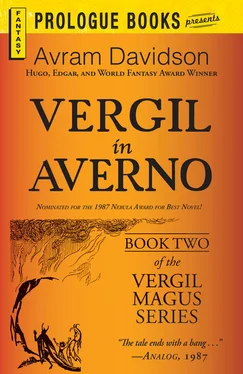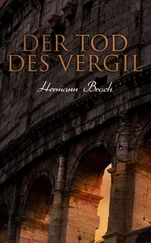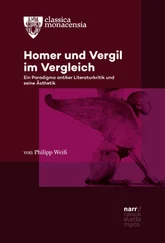Avram Davidson - Vergil in Averno
Здесь есть возможность читать онлайн «Avram Davidson - Vergil in Averno» весь текст электронной книги совершенно бесплатно (целиком полную версию без сокращений). В некоторых случаях можно слушать аудио, скачать через торрент в формате fb2 и присутствует краткое содержание. Жанр: Фэнтези, на английском языке. Описание произведения, (предисловие) а так же отзывы посетителей доступны на портале библиотеки ЛибКат.
- Название:Vergil in Averno
- Автор:
- Жанр:
- Год:неизвестен
- ISBN:нет данных
- Рейтинг книги:3 / 5. Голосов: 1
-
Избранное:Добавить в избранное
- Отзывы:
-
Ваша оценка:
- 60
- 1
- 2
- 3
- 4
- 5
Vergil in Averno: краткое содержание, описание и аннотация
Предлагаем к чтению аннотацию, описание, краткое содержание или предисловие (зависит от того, что написал сам автор книги «Vergil in Averno»). Если вы не нашли необходимую информацию о книге — напишите в комментариях, мы постараемся отыскать её.
Vergil in Averno — читать онлайн бесплатно полную книгу (весь текст) целиком
Ниже представлен текст книги, разбитый по страницам. Система сохранения места последней прочитанной страницы, позволяет с удобством читать онлайн бесплатно книгу «Vergil in Averno», без необходимости каждый раз заново искать на чём Вы остановились. Поставьте закладку, и сможете в любой момент перейти на страницу, на которой закончили чтение.
Интервал:
Закладка:
And stop him Vergil could not, see the silver he must, and so he did. And watched the man sag as he listened to hear that Vergil wanted such a map as much as he himself did: and had none. “Though I shall try and let you see, and. . if I have time. . and let you take a copy of my own, when I make it. And your silver you may keep.”
Finally, in a sort of not-yet desperation, and acting upon what the librarian mentioned as a wild hope, he took the way to the tax office, where he was, reluctantly, and after several applications and armed with orders and permits, reluctantly allowed to copy a copy of the cadastral map. “Who knows who mayn’t begin to complain about taxes if he get a chance to see where his own property lines be drawn; ah, well!”
And with this as his prime material he began his next stage of work. After he had made sketches, after he had checked and rechecked the sketches, next Vergil drew more orderly copies. He made grids. He brought to play all he had learned from Euclid and Apollonius and Ptolemy. He did not of course have to show latitude; it was enough if he was able to show scale, and — of equal importance — keep the same scale on each of the maps.
Which is where, space having been established, time entered. And this took even more time than had the matter of space.
Regretting the present absence of his servant, he had perforce to carry on by himself; with his wax-inlaid tablets in one hand and his style or stylus in the other (its well-worn handle, of nondescript wood, had by long usage almost become fitted to his hand; its iron point had been sharpened more than once, though its use upon the wax would hardly ever exemplify the old principle that “the anvil wears the hammers out.” Unceasingly, hour to hour, from day to day, he went about the city, questioning not the magnates alone but their foremen and servants and slaves; when the tablets were on both sides filled up, he transcribed the data into a book he kept always with him, and with the blunt end of the style rubbed out the former notes and rubbed the waxy surfaces smooth, then began again. He dragged up ancient hulks and wrecks of human refuse from gutters, from under the arches of the aqueducts where the cold water dripped upon them, from the ash-tips next to whose heaped hot refuse those without homes kept warm, he asked them,
“Where were the flames when you worked?”
“When did you work?”
“Where did you work?”
“How do you remember?”
“How do you know what year it might have been?”
Clear and crisp the questions might have been, but clear and crisp the answers could not be; not, considering, who was being asked. Much watered wine — cheap, bad, the worst, nonetheless welcome, nonetheless essential — was supplied, gulp by gulp; and much broken bits of bread — also cheap, and, as sometimes, if it was too stale, into the watered wine it went to soften — was supplied, before minds could bethink them and mouths mumble answers.
“What other events happened in such and such a year?”
“Do you recall having heard the number of the year of the Reign?”
“You are quite sure that was the Emperor then?”
“Who was consul?”
“When your master’s works was moved because the flames ‘went sick,’ was there news of war? With whom, war?”
“Heard you anyone speak, those years, you do not remember exactly which years, of prices rising or falling? Which prices?”
Understanding of what he intended there was probably none, it was to none of their immediate advantage to figure what it might be or to guess at it; likely beyond capacity, for that matter. Interest? At first, none. . save for the wine and the small coin and the bread. How did Vergil, how could Vergil know, that they were not merely inventing, filling a vacant mouth with lies in order to fill a vacant belly? Had he begun with them, those, the castoffs, he could not have known. By having begun with those whose interest it was he should know the truth — the magnates — he had therefore somewhat of a list to check against. And. . among those at the bottom. . or as near to the bottom as they could get without getting to the top of the bone-pit. . it was curious to see how indifference of one would sometimes, often, increasingly often, change to interest when hearing what some other outthrown had to say -
“Nuh! Nuh, master! Julius was Emp’ro’ when they move them work to South Gorge. Him’s wrong” — gesturing to another.
And: “War! I say, was war!” was the other’s reaction, he having said nothing at all about war till then, and who ignored his possible error in re the name of the then-emperor. “War in Parth’a, was, ‘en they move them Magnate Muso work, South Gorge!” And his vehemence died off into a cough, a trickle of some inclement ichor oozing from his protruding and pendulous lip, down upon his trembling chin; nor was it wiped away.
Whilst Vergil rapidly scrawled all this, yet a third, who till now had but stared vacantly, moving slowly round and round and gazing only at the refreshments, as though he knew not what substances they might be or what purpose to serve, this yet-a-third would crick back his head and look down his nose from wide-rolled red thick-rimmed eyes in order to add emphasis to what he had just recalled from the fragments of hell that made up his past — ”Feast! ‘Ey gived a feast! T’Big Slave ‘e comed out an’ ‘e gived us each a piece o’ meat!” (He repeated this memory of a phenomenon.) “A why?. . piece o’ meat . . big as. . big as my hand! A why?. . T’Big, ‘e say, master gived a feast wit’ Consul Livio, come from Rome . As we ‘feated t’Parth’ans! Oh, whudda ‘feat we gived ‘em! By ‘Cbatan’! So, yeah, uh. . uh …” The light of his recollection dimming fast, he turned to the stranger who had quickened it. Something else seemed now about to emerge. Vergil waited, marveling much that after — how long? twenty years? twenty-five? — the memory of a dusty battle on a distant frontier should remain in the mind of this human ruin because he had received, of the leftovers from a feast in joy of it, a piece of meat as large as his hand.
And as he waited to hear what else be forthcoming, the remembrancer said, “Master. . ‘as y’ got a nub o’ garlic witcha?”
This modest relish Vergil was obliged to disavow, but gave the yet-a-third his dole, and then scribbled a line or two more in the fragrant wax. Eventually this might emerge as Fires at Magnate Muso’s works diminished, requiring said works to remove to South Gorge; Julius was Emperor: check year of Livio’s consulate with defeat of the Parthians at Ecbatana; and, Fires in South Gorge; and, Muso’s Works — where previously? . . And so on. And so on. And as for those who might not remember the names of monarchs, consuls, wars, defeats, of foes in Asia Magna — or who, as likely, had never known — it was useful to have learned, from some scrap picked up by the dripping waterbridge, some incident that had burned like fire into even the most eroded mind; to be able, thus, to inquire, “Was this before or after Vitolio murdered his wife, his daughter, his steward, and his son?”
Presently Vergil was to take out the carefully prepared translucent sheets and to draw grids great and small upon them, to make his designations, and to make them in the heaviest and darkest of inks, that prepared from scuttlefish, fashioned after the manner of India. And when one sheet was placed upon another, what lay beneath would be (when desired to be) visible even through what lay on top. And so eventually he would have his master map prepared, and painted in sundry colors.
And he would point.
And he would show.
But before that time.
Vergil was pleased to see Iohan return well before the end of the time he had been prepared to wait without worrying. The mare (Vergil was pleased to see her, too, and she returned his pat with a nuzzling that seemed to show that she was pleased as well, had not forgotten him, and — But before he could quite recall what else it had seemed to him that she seemed, he observed her quite laden down with close-woven basketry; even they were stacked upon the saddle; and Iohan had arrived on foot, with a story as well.
Читать дальшеИнтервал:
Закладка:
Похожие книги на «Vergil in Averno»
Представляем Вашему вниманию похожие книги на «Vergil in Averno» списком для выбора. Мы отобрали схожую по названию и смыслу литературу в надежде предоставить читателям больше вариантов отыскать новые, интересные, ещё непрочитанные произведения.
Обсуждение, отзывы о книге «Vergil in Averno» и просто собственные мнения читателей. Оставьте ваши комментарии, напишите, что Вы думаете о произведении, его смысле или главных героях. Укажите что конкретно понравилось, а что нет, и почему Вы так считаете.












